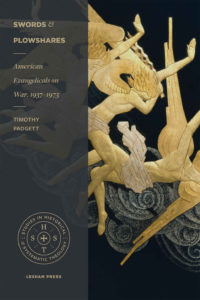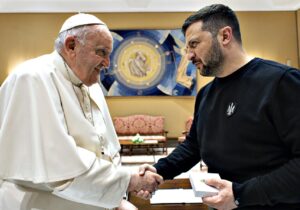Modern authors tend to view American evangelicals as a monolithic assembly, rarely describing the varying facets of their beliefs. In his book Swords and Plowshares: American Evangelicals on War, 1937–1973, Timothy D. Padgett attempts to dispel this misconception and articulate the spectrum of opinions held by American evangelicals regarding war to demonstrate that American evangelicals were not universally “hawkish on foreign policy.” Padgett’s work is useful for those seeking a broad understanding of American evangelical thought about war, although it does leave the reader wanting more.
Timothy D. Padgett, managing editor of BreakPoint.org with the Colson Center for Christian Worldview, has taught theology, history, and Christian worldview at several Christian colleges in the Chicago area and has worked with the Francis Schaeffer Institute. While Padgett has written articles on a variety of issues, Swords and Plowshares is his first published book.
 Noting that misconceptions regarding evangelical views of war and conflict abound, Padgett’s stated purpose in authoring Swords and Plowshares is “to examine evangelical comments about American wars … [and] the manifestations of their ideas in all their complexity.” He does so using key evangelical publications such as Christianity Today and Moody Monthly as well as the letters and essays of individuals such as Carl F. Henry and Francis Schaeffer during the period 1937–1973. Padgett organizes his research by dividing each of ten chronological chapters into five parts, providing an overview of historical events in each era, followed by an analysis of evangelicals’ writings regarding enemies of America, American society, war, and eschatology.
Noting that misconceptions regarding evangelical views of war and conflict abound, Padgett’s stated purpose in authoring Swords and Plowshares is “to examine evangelical comments about American wars … [and] the manifestations of their ideas in all their complexity.” He does so using key evangelical publications such as Christianity Today and Moody Monthly as well as the letters and essays of individuals such as Carl F. Henry and Francis Schaeffer during the period 1937–1973. Padgett organizes his research by dividing each of ten chronological chapters into five parts, providing an overview of historical events in each era, followed by an analysis of evangelicals’ writings regarding enemies of America, American society, war, and eschatology.
Noting that “evangelical loyalty to their early citizenship was tempered by their reliance on divinely established standards of human morality and trumped by their abiding fealty to their heavenly citizenship,” Padgett fleshes out this concept in each chapter, highlighting areas where evangelicals’ views aligned with American military action, as well as areas where these views diverged. Simultaneously, Padgett highlights evangelicals’ focus on spiritual wellbeing, noting that they could “complain about American immorality while pleading for support of their fellow Christians on the other of an international frontier.” Swords and Plowshares’ best analysis of this mindset can be seen in the chapters on World War II and the Vietnam War.
During WWII, American evangelicals “attempted to apply biblical wisdom to a modern horror.” Padgett points out that while evangelicals supported the war against the Axis powers, their view was “qualified by the biblical command to love one’s neighbor.” While evangelicals wrote that “dictators should be reminded that men have been crowned as victors one month and covered as corpses the next,” they also noted that “someone being an enemy had as much to do with chance of birth as it did a conscious choice.” At the same time, evangelical support of America was tempered, as Padgett notes, by the belief that “America’s blessing by God was entirely dependent on America’s connection to [authentically lived] Christianity.”
During the Vietnam War, however, there was some division among evangelicals. Some praised United States involvement as being beneficial to American interests, stating “the highest interest of the church of Jesus Christ are being served by American participants in Vietnam.” Others, however, opposed the war, asserting, “I am sick to death of the way both Russia and my country are making these beautiful people do their fighting for them.” Regardless of which view they held, American evangelicals generally agreed that communism should be opposed, perceiving it as the opposite of Christianity. Indeed, a major theme is that a majority of evangelicals tended to support responsible US action against totalitarianism, even while realizing that the US had its own flaws on race and immorality at home.
Swords and Plowshares provides an easy-to-read explanation of American evangelicals’ thoughts on war. Padgett’s presentation helps to humanize American evangelicals and portray their views in a manner that is largely indistinguishable from many moderately conservative, patriotic authors of the time. His extensive documentation does meet Padgett’s stated goal of correcting misunderstandings regarding American evangelicals. He shows that evangelicals, like most Americans, were proud of the good in their country but realized that a responsible America would have to use power on the world stage to contain evil.
Padgett does a good job of distinguishing the positions of many important evangelicals, like Carl Henry, on the responsible use of military force. This is thoughtfully contrasted with leaders in many mainline denominations who were pacifistic. In contrast, though, Padgett neglects the language of the Christian just war tradition, which was being recovered by Catholic and Protestant writers following World War II, most notably the moral critiques of Elizabeth Anscombe and the just war thinking of Paul Ramsey. Similarly, this book has nothing of substance to say about the influential voice of Christian realists such as Reinhold Niebuhr. The reader is given the impression that key evangelicals, like Henry, were not reading or engaging the opinions of individuals like Niebuhr, but that is leaving out history.
Padgett began the book by recognizing that “popular and academic imaginations” portray evangelicals in “a less than complimentary manner.” He rightly suggests that “trying to get an accurate impression of religious reality from movies and TV is like picking up your understanding of physics from cartoons.” He helps us have a more nuanced portrait of evangelicals, one which demonstrates that they were largely patriotic American citizens worried about the moral quality of public life in the US and were willing to sacrifice for the US to responsibly use power to counter the evils of Germany, Japan, and later the Soviet Union. He shows that evangelical support for Israel is deeply rooted, but that many evangelicals supported post-war Jewish refugees out of loving concern, not to bring on the apocalypse. He demonstrates that key evangelical voices, via broadcast and print media, were providing wise counsel to churchgoing citizens during times of social stress and rapid change. Overall it is a useful, fair-minded portrayal of American evangelicalism during this critical period in world history.
Jonathan Monroe holds an MA in government from Regent University and a Bachelor’s degree from Patrick Henry College. He is currently a student at Regent Law School. Eric Patterson, PhD, is Executive Vice President of the Religious Freedom Institute and Scholar at Large at Regent University. He is a contributing editor to Providence and the author or editor of 14 books, including Just American Wars: Ethical Dilemmas in US Military History and Politics in a Religious World: Toward a Religiously Literate US Foreign Policy.
Photo Credit: “Prayer for Their Buddies.” During the Battle of Cape Gloucester, New Britain, December 1943–January 1944, a chaplain says a benediction for US Marines who lost their lives in the capture of the airport at Cape Gloucester. The American flag had just been raised on the airport. Major General William H. Rupertus, commanding general of the Marine division that made the New Britain invasion, stands at left. A wrecked Japanese bomber forms a ghostly altar during mass, January 1944. Official US Marine Corps Photograph, now in the collections of the National Archives.






